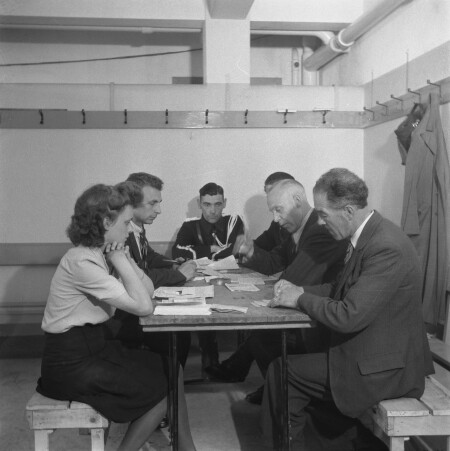Sixteen projects approved to deal with the backlog of digital collection data
25 Jan 2022In May 2021, the Flanders Department of Culture, Youth and Media launched an additional call for awarding grants to projects that will help to deal with the backlog of digital collection data. In October, 31 organisations submitted applications, 26 of which were supported by meemoo – and 16 of them have now been approved to get started.
The Flemish Government made a total of €1,764,500 available for the approved projects. This is more than initially planned, and it means that not just ten but sixteen organisations can now take significant steps in the field of digital registration, digitalisation and valorisation. A huge boost! The approved projects are being run by ADVN (Archive for National Movements), CAVA (Centre for Academic and Liberal Archives), CAG (Centre for Agricultural History), KOERS (Museum of Cycle Racing), Musea Brugge, House of Alijn, AGB Memorial Museum Passchendaele 1917, STAM (Ghent City Museum), Red Star Line Museum, Middelheim Museum, Mu.ZEE, Flanders Heritage Library, KADOC (Documentation and Research Centre on Religion, Culture and Society from KU Leuven), Zuidwest Heritage Agency, MuHKA (Museum of Contemporary Art Antwerp) and Eperon d’Or (Industrial Heritage Site).
A wide range of projects
Until the end of 2023, these organisations will be focusing on registering, digitising, cleaning up and enriching very diverse collections, and making them accessible (linked and open) online. These projects don’t just involve biographical, archaeological and museum collections, but also collections of puppets, prints, cycling photography, sculptures, magazines, shoes, personalia, intangible heritage, incunabula, donations and academic figure drawings!

Een groep mensen, waaronder een vrouw en een marechaussee rond een tafel in een kleedkamer bekijken papieren, 1945, Anefo, CC0
Among other things, this year there will be lots of experimentation with 3D recordings, documentary capturing of knowledge, the development of collection-oriented procedures for clearing privacy rights and copyrights, automatically adding metadata using handwritten text recognition (HTR) and optical character recognition (OCR), safeguarding geodata, and making images available via IIIF services.
The next stage?
Now that the projects have been approved, they can actually get started, with meemoo providing extensive support. Specifically, we will be assessing expectations and coordinating activities in start-up meetings with each organisation. The organisations can count on the team from meemoo for advice over the course of their projects, and we’ll also be referring to other institutions in the sector that can offer in-house expertise, so that we can look beyond our own individual limits to achieve more together.
Getting to know OSLO
This year, we’re paying lots of attention to the implementation of OSLO (Open Standards for Linking Organisations) Cultural Heritage (link in Dutch) – an initiative set up by the Flemish Government to have a uniform standard for exchanging information – which was one of the criteria set for the applications.
For more information about OSLO, visit Informatie Vlaanderen (Flanders Information Agency) and Digitaal Vlaanderen (links in Dutch). Digitaal Vlaanderen ran a workshop about this initiative at the last Digital Collection Registration Peer Group meeting. You can find the presentation here (link in Dutch).
The OSLO launch event for the Collections of Ghent took place on 27 January. Experiences of this standard were shared at this webinar to help attendees discover what steps they need to take to get started with it themselves.
This extra round of funding for dealing with the backlog is part of the Flemish Government’s Resilience Recovery Plan. Meemoo is also involved in other projects in this plan, including GIVE, Digisprong and the integration of Flemish heritage databases.
